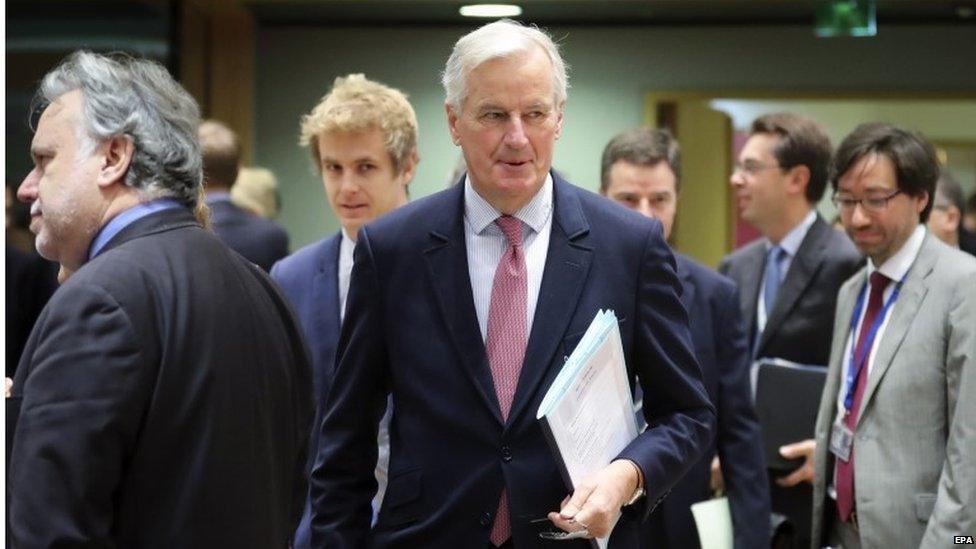MPs can stop no-deal Brexit, says Labour's Starmer
- Published
- comments
"All options are on the table" if there is a no deal Brexit, Starmer tells Today
Parliament will not allow the UK to leave the European Union without a negotiated agreement, shadow Brexit secretary Sir Keir Starmer has claimed.
Asked during a BBC interview whether MPs could prevent a no-deal exit, he replied "absolutely".
Labour leader Jeremy Corbyn suggested on Friday Brexit could not be stopped because the people had voted to leave.
But Sir Keir said if 400 or so MPs were opposed to a no-deal exit, they would be able to force the government's hand.
The BBC's political editor Laura Kuenssberg said no-one really knew what would happen if Parliament voted down any agreement reached between the UK and the EU in the coming weeks and it could open a "Pandora's Box".
One former cabinet minister, John Whittingdale, has suggested that Theresa May would have to step down if she "staked her credibility" on a deal which did not command the confidence of MPs.
The UK is due to leave the EU on 29 March 2019.
The two sides are trying to hammer out an agreement on the terms of the UK's exit in the coming days which could be put to a special summit of the 28 EU leaders at the end of November.
The EU's negotiator Michel Barnier told European ministers on Monday that intense negotiating efforts were continuing but no agreement had been reached and the EU must prepare for every possible scenario.
Arriving for the meeting in Brussels, Brexit minister Lord Callanan said the UK was trying hard to get a deal but claimed it had not set a "particular deadline" and we "have to take time to make sure its right".

The EU's Brexit negotiator Michel Barnier has said preparations need to be made for all scenarios
But the BBC's assistant political editor Norman Smith said if no agreement was reached imminently, the reality was that things would get "more ominous" for Mrs May.
While the UK's no deal preparations would have to be intensified, he said there were fears it would be harder to get MPs' support if the crunch Commons vote on accepting or rejecting the deal did not happen until the start of 2019.
Labour leaders have said they are unlikely to support any agreement as it stands, with Sir Keir telling BBC Radio 4's Today that "there is no duty to vote for the wrong deal".
The opposition has said it will press for a general election in the event of Parliament rejecting a deal but - if that does not happen - "all options" should remain on the table, including the possibility of a new Brexit referendum.
'Ruptures'
Asked whether MPs would be able to force such an outcome, he said they would use the parliamentary process to "assert themselves" and, at the very least, "indicate" what should happen in the event of a deadlock.
He suggested Mrs May herself would not be prepared to see the UK leave without a deal.
"I am confident that the majority in Parliament will not countenance a no deal," he told BBC Radio 4's Today. "So the question is can Parliament stop no deal if it becomes necessary? Absolutely.
"If there was a motion that 400-plus MPs supported saying we do not countenance a no-deal, then the prime minister would have to go forward in the teeth of Parliament.
"Of course I am critical of the prime minister on a number of fronts but I don't think she would simply take us out of the EU without a deal in the teeth of the vast majority in Parliament.
"She has got a deep sense of duty. She knows the ruptures that would cause, not just on trade, but on security and counter-terrorism. She knows that."
Sir Keir acknowledged continuing divisions within Labour over the question of another referendum but insisted that the party had decided at its conference in September that it should not be ruled out.
"On this question of options on the table, we had a long, long discussion about it and we did agree all options to remain on the table including the option of a public vote.
"The Labour Party has had a healthy discussion. But did we reach an agreement? Yes we did. Are we sticking to it? Yes we are. Neither Jeremy nor anyone else has altered that position, that is the position of the Labour Party."